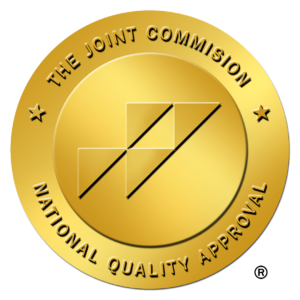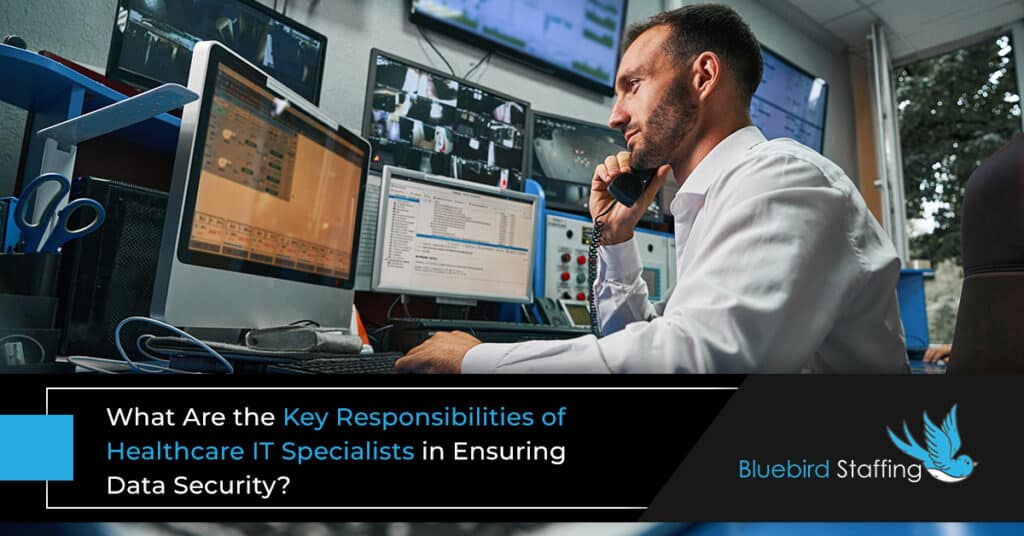In the digital age of healthcare, where Electronic Health Records (EHR) and other technologies play a pivotal role in patient care, the responsibility of safeguarding sensitive data falls heavily on the shoulders of healthcare IT specialists. These professionals are tasked with implementing robust security measures, mitigating risks, and ensuring compliance with regulatory standards to protect patient privacy and confidentiality. It’s a huge responsibility, and Forbes cautions, “The global pandemic has accelerated data and processes, challenging the world to change. However, healthcare’s ability to protect patient privacy becomes questionable.”
Let’s delve into the key responsibilities of healthcare IT Specialists in ensuring data security within their organizations. Can they measure up to the job?
Implementing Security Measures
One of healthcare IT specialists’ primary and most obvious responsibilities is to implement comprehensive security measures to safeguard patient data against unauthorized access, breaches, and cyber threats. But the sheer scope of the networks that must be covered is daunting. Forbes says, “The difficulty lies in the fact that there are many networks and digital complexes in any clinic or hospital: EHRs, e-prescribing and decision support systems, intelligent heating, ventilation, and air conditioning (HVAC), infusion pumps, medical internet of things (IoMT) devices, etc. All of them can be threatened by cybercriminals.”
Healthcare IT specialists deploy various technologies and techniques to shore up data security, from deploying firewalls, encryption protocols, and access controls, to on-site intrusion detection systems. By staying abreast of emerging threats and best practices in cybersecurity, IT Specialists can proactively identify vulnerabilities and mitigate risks before they escalate into security incidents.
Conducting Risk Assessments
Cybersecurity is a moving target; the threats change rapidly. That’s why healthcare IT specialists should conduct regular risk assessments to identify potential vulnerabilities, weaknesses, and compliance gaps within the organization’s IT systems. Through thorough risk analysis, IT teams can prioritize security initiatives, allocate resources effectively, and develop mitigation strategies to address identified risks. This kind of proactive approach enables healthcare organizations to preemptively mitigate security threats and enhance their overall security posture.
Ensuring Regulatory Compliance
Compliance with regulatory standards such as the Health Insurance Portability and Accountability Act (HIPAA)or the General Data Protection Regulation (GDPR) is paramount in healthcare data security. Healthcare IT staff play a crucial role in ensuring the organization’s IT systems and practices comply with relevant regulations and industry standards. This effort involves implementing appropriate security controls, conducting regular audits, and maintaining documentation to demonstrate compliance with regulatory requirements. By adhering to regulatory standards, IT specialists help protect patient privacy and mitigate the risk of legal and financial penalties associated with non-compliance.
Providing User Training and Awareness
Human error remains one of the leading causes of data breaches in healthcare. Healthcare IT Specialists are responsible for providing comprehensive user training and awareness programs to educate employees about the importance of data security, best practices for safeguarding sensitive information, and the potential consequences of security lapses. By empowering employees with the knowledge and skills to recognize and respond to security threats effectively, IT Specialists can strengthen the organization’s defense against insider threats and social engineering attacks.
Incident Response and Remediation
Despite proactive security measures, security incidents may still occur. Healthcare IT teams also play a critical role in incident response and remediation efforts, including identifying the root cause of security breaches, containing the impact, and implementing corrective actions to prevent future occurrences. This effort may involve conducting forensic analyses, collaborating with law enforcement agencies, and implementing security patches or updates to mitigate vulnerabilities. Prompt and effective incident response is essential to minimize the impact of security incidents and restore trust in the organization’s ability to protect patient data.
Are You Looking for a New Healthcare IT Specialist Opportunity?
There is a cybersecurity talent shortage, which is why so many healthcare organizations turn to Bluebird Staffing to find experienced job candidates. That means our firm can give you a leg up on the best cybersecurity opportunities to take your career to the next level. Check out our hot jobs and talk with our team today about the pivotal role an IT specialist can play in these organizations—and how we can help you connect with them.



